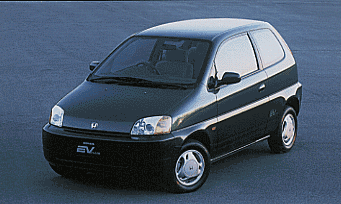By Graeme Fletcher

Motegi, Japan • Honda is set to introduce a new plug-in hybrid and an all-electric version of the Fit. The two are part of an exercise that falls under the company’s Earth Dreams Technology umbrella. Both will be launched in the United States next year. At this point, Honda Canada is still evaluating the viability of bringing one or both to Canada. Put my vote in the bring box!
The new plug-in hybrid uses an entirely new drivetrain — a gasoline-powered engine that is teamed with not one but two electric motors. This is a significant move that vaults Honda into the full-on hybrid league. As such, the plug-in hybrid can run on electric power, a combination of the gasoline and electric power sources or on the gasoline engine alone.
The new 2.0-litre Atkinson-cycle engine uses direct injection along with i-VTEC and variable cam phasing. The combination boosts torque and horsepower considerably while reducing fuel consumption by five per cent compared with the current 1.5L engine used in the Civic Hybrid.
As it stands, the gasoline engine produces 134 horsepower and 111 pound-feet of torque (although one should expect slightly better numbers in the production car). The main electric motor chips in with another 161 hp and 221 lb-ft of torque. The second electric motor plays the role of a generator.
Where this system differs from others is that the plug-in hybrid is designed to run on the electricity stored in the six-kilowatt/hour battery — which requires 1.5 hours to recharge using 220 volts — for the first 24 kilometres of the drive. When it’s depleted, the gasoline engine kicks in and drives the generator, which then provides the electricity consumed by the main electric motor.
At highway speeds, the plug-in decouples the electric side and runs on the gasoline engine alone. The interesting part is that, in each case, the motor and engine drive the wheels directly as there is no multi-speed gearbox.
It sounds complicated, but the system is remarkably seamless in the manner in which it operates. Launch is strong thanks to the motor’s low-end torque, and the delivery of power remains linear through the mid-range. Push on a little harder and the gasoline engine fires up and keeps things rolling along nicely.
The test drive of the new hybrid system was conducted in the current Accord sedan — which model will see the production version of the plug-in hybrid system is still up in the air (although my money says Accord).
Outwardly, the Honda Fit EV looks (graphics aside) exactly like its gasoline-powered sibling. In fact, it is only when climbing behind the wheel does one find the first big difference — step-in height is taller because the car has been raised to accommodate the 20-kWh main battery beneath the floor, where it is protected as well as provides a lower centre of gravity. Recharging the battery is done through an onboard charger. The 6.6-kW unit is capable of fully recharging the battery in three hours when using a 220-volt outlet. The downside is the 18 hours it takes to accomplish the same with a regular 110-volt outlet.
In lieu of the 1.5L four-cylinder engine, the EV adopts a derivative of the electric motor that currently sees duty in the fuel cell-powered Clarity. In this instance, it delivers 123 hp and 189 lb-ft of torque. The output is such that the Fit EV enjoys the same sort of acceleration as its regular compactsized counterpart equipped a 2.0L gasoline engine — credit the early arrival of the torque and the fact it stays with the program through the mid-range and on to the top end.
The Fit EV has the potential of delivering a city driving range of 195 km and a highway rating of 150 km. The difference in the distances is due to the lack of regenerative braking when the Fit is driven at a constant speed.
However, Honda is up front and admits that these are ideal distances. As such it takes the ideal and multiplies it by 0.7 to arrive at a real-world number. The multiplier takes into account the power needed to drive the electric air conditioner and power steering, provide heat in winter and supply the power requirements for everything from the radio to the wipers and heated seats. In the end, the Fit EV can provide 125 km of everyday real-world fun.
The EV also features a three-mode drive system similar to the one found in the CR-Z. In economy mode the throttle is much softer (actually too soft for most situations). The caveat to this is that if the distance to empty is getting tight, selecting the eco mode might just be the difference between getting home and not.Selecting the sport mode sharpens things appreciably, but it does so at the expense of driving range (it reduces the driving distance by up to 25% when compared with the economy mode). As such, normal mode is the best, as it balances the desire for performance with the need for a usable driving range.
As for the rest of it, the EV is every bit a Fit. It does not suffer because of the additional mass added by the battery, nor is there any compromise in the utility aspects.
The all-too-brief test drives proved both plug-in hybrid and Fit EV are road ready. Both offer surprising performance and have a ton to offer in terms of reducing the toll the automobile places on the planet.
Source;
http://life.nationalpost.com/2011/11/30/preview-2013-honda-fit-evplug-in-hybrid/ IBM, Honda’s American arm and Pacific Gas and Electric will collaborate on a pilot project to allow communication between electric vehicles and the power grid, the companies have announced.
IBM, Honda’s American arm and Pacific Gas and Electric will collaborate on a pilot project to allow communication between electric vehicles and the power grid, the companies have announced.
























 TOKYO, Aug 22 (Reuters) - Honda Motor Co Ltd (
TOKYO, Aug 22 (Reuters) - Honda Motor Co Ltd (